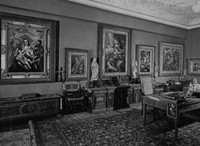-
D.C. Circuit Revives Claims Seeking Return Of Nazi-Seized Art
04/23/2013
 The D.C. Circuit ruled recently that the heirs of a legendary Hungarian art collector could proceed with their claims against Hungary to recover eleven works seized by the Nazis notwithstanding a Hungarian court ruling to the contrary. See De Csepel v. Republic of Hung., 2013 U.S. App. LEXIS 7837 (D.C. Cir. April 19, 2013). This decision highlights the many legal issues—and obstacles—involved in cases seeking the return of art stolen during World War II.
The D.C. Circuit ruled recently that the heirs of a legendary Hungarian art collector could proceed with their claims against Hungary to recover eleven works seized by the Nazis notwithstanding a Hungarian court ruling to the contrary. See De Csepel v. Republic of Hung., 2013 U.S. App. LEXIS 7837 (D.C. Cir. April 19, 2013). This decision highlights the many legal issues—and obstacles—involved in cases seeking the return of art stolen during World War II.
As part of the wholesale plunder of Jewish property during the Holocaust, the Hungarian government—operating together with the Nazi regime—confiscated one of Europe’s largest and finest private art collections, the “Herzog Collection.” After the Hungarian government seized the collection, a pro-Nazi newspaper ran an article quoting the director of the Hungarian Museum of Fine Arts bragging about the significance of “acquiring” the Collection: “[t]he Mór Herzog collection contains treasures the artistic value of which exceeds that of any similar collection in the country. . . . If the state now takes over these treasures, the Museum of Fine Arts will become a collection ranking just behind Madrid.”
For many years, the Herzog heirs tried in vain to have the works returned, first negotiating directly with the Hungarian government, and then, once those negotiations failed, filing suit in Hungary in 1999 seeking the return of various works. After years of litigation, including several rounds of appeals, the Hungarian court dismissed the action in 2008, holding that the claim “had been extinguished by [an executive agreement settling certain claims by U.S. nationals against Hungary], and that additional defendants had acquired title through adverse possession.” On July 27, 2010, several members of the Herzog family filed suit in federal court in Washington, D.C. against the Republic of Hungary and the Hungarian national Gallery, among others.
The trial court upheld several of the family’s claims, and dismissed others on international comity grounds. The court of appeals, in affirming in part and reversing in part the lower court’s ruling, held initially that the claims were not barred by the Foreign Sovereign Immunities Act because, among other things, Hungary’s underlying conduct constituted acts taken in connection with a “commercial activity,” and therefore is exempt from the protection of the FSIA. The court was equally unpersuaded by Hungary’s arguments that its acts were barred by the political-question doctrine and the act-of-state doctrine, which “requires American courts to presume the validity of an official act of a foreign sovereign performed within its own territory.” The appeals court also agreed with the Herzog heirs that they should have been given an opportunity to develop the factual record concerning their claims that they had been denied internationally recognized standards of due process in connection with the Hungarian court proceedings.
This decision highlights the legal and factual considerations at the center of suits seeking the return of Nazi-looted art. As for the Herzog family, their collection was seized almost 70 years ago; they filed suit in Hungary 14 years ago and litigated that dispute for 9 years; and they commenced litigation in United States federal court almost three years ago. Their efforts to have their family’s works returned—and their lawsuit—will now continue.
Art Law Blog
